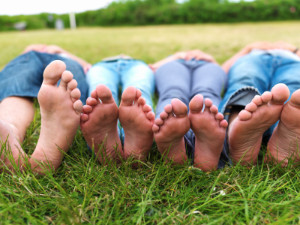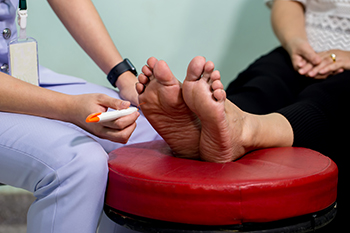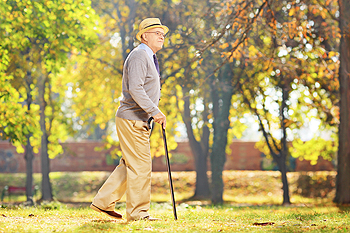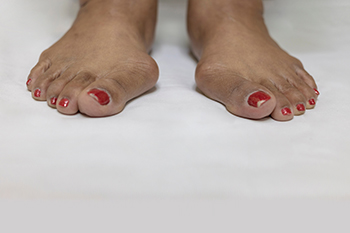Items filtered by date: October 2022
Get Professional Care for a Broken Foot or Ankle
What Is Juvenile Plantar Dermatosis?

As a child grows and matures into a young adult, there are several different foot afflictions that can prevent the child from reaching their full potential to have healthy feet. Juvenile Plantar Dermatosis is one such condition and it is defined as symmetrical and shiny peeling of the skin on the feet in children. The condition can also be defined as a certain kind of fissuring on the feet. Many things about this foot condition remain unclear and unknown. However, it is thought that some combination of moisture and repeated friction is the likely cause. Although each case is different, typically a medical professional will recommend that the patient remedies this condition by controlling the extent to which their feet produce and come into contact with moisture. Take your child to a podiatrist today if they are suffering from Juvenile Plantar Dermatosis.
Making sure that your children maintain good foot health is very important as they grow. If you have any questions, contact Priyanka Mude, DPM of North Canton Podiatry. Our doctor can provide the care you need to keep you pain-free and on your feet.
Keeping Children's Feet Healthy
Having healthy feet during childhood can help prevent medical problems later in life, namely in the back and legs. As children grow, their feet require different types of care. Here are some things to consider...
Although babies do not walk yet, it is still very important to take care of their feet.
Avoid putting tight shoes or socks on his or her feet.
Allow the baby to stretch and kick his or her feet to feel comfortable.
As a toddler, kids are now on the move and begin to develop differently. At this age, toddlers are getting a feel for walking, so don’t be alarmed if your toddler is unsteady or ‘walks funny’.
As your child gets older, it is important to teach them how to take care of their feet.
Show them proper hygiene to prevent infections such as fungus.
Be watchful for any pain or injury.
Have all injuries checked by a doctor as soon as possible.
Comfortable, protective shoes should always be worn, especially at play.
If you have any questions please feel free to contact our office located in North Canton, Ohio . We offer the newest diagnostic and treatment technologies for all your foot and ankle needs.
Several Causes of Neuropathy

One of the symptoms that are associated with neuropathy includes a burning sensation in the feet. This can be a result of nerve damage and it can also cause a tingling or numbing feeling. Diabetic patients may develop neuropathy, and this can be from having elevated blood sugar levels. Additionally, other medical conditions can cause neuropathy, such as obesity and high blood pressure. Neuropathy may also affect people who smoke cigarettes and drink excessive alcohol. Many people get fatigued easily when neuropathy is present, which may cause muscle and bone pain. People who have neuropathy can find it difficult and painful to walk and may notice a difference in skin color. Having nutritional deficiencies could result in the development of neuropathy, including vitamins B-12, B-6, and B-9. If you are afflicted with this foot condition, it is strongly advised that you are under the care of a podiatrist who can accurately treat and monitor neuropathy.
Neuropathy
Neuropathy can be a potentially serious condition, especially if it is left undiagnosed. If you have any concerns that you may be experiencing nerve loss in your feet, consult with Priyanka Mude, DPM from North Canton Podiatry. Our doctor will assess your condition and provide you with quality foot and ankle treatment for neuropathy.
What Is Neuropathy?
Neuropathy is a condition that leads to damage to the nerves in the body. Peripheral neuropathy, or neuropathy that affects your peripheral nervous system, usually occurs in the feet. Neuropathy can be triggered by a number of different causes. Such causes include diabetes, infections, cancers, disorders, and toxic substances.
Symptoms of Neuropathy Include:
- Numbness
- Sensation loss
- Prickling and tingling sensations
- Throbbing, freezing, burning pains
- Muscle weakness
Those with diabetes are at serious risk due to being unable to feel an ulcer on their feet. Diabetics usually also suffer from poor blood circulation. This can lead to the wound not healing, infections occurring, and the limb may have to be amputated.
Treatment
To treat neuropathy in the foot, podiatrists will first diagnose the cause of the neuropathy. Figuring out the underlying cause of the neuropathy will allow the podiatrist to prescribe the best treatment, whether it be caused by diabetes, toxic substance exposure, infection, etc. If the nerve has not died, then it’s possible that sensation may be able to return to the foot.
Pain medication may be issued for pain. Electrical nerve stimulation can be used to stimulate nerves. If the neuropathy is caused from pressure on the nerves, then surgery may be necessary.
If you have any questions, please feel free to contact our office located in North Canton, Ohio . We offer the newest diagnostic and treatment technologies for all your foot care needs.
Improved Balance and Strength May Reduce the Risk of Falling

Falling is common among people who are 65 years and older, and research has shown that frequently exercising may reduce this risk. This may be a result of increased strength in the muscles, bones and tendons, in addition to achieving improved balance. It is suggested that exercise is started slowly with practicing a few exercises per day until the body gets accustomed to it. This can be followed by increasing the number of repetitions and intensity. It is helpful to wear appropriate shoes that have adequate cushioning while exercising, in addition to using support if needed. Many people enjoy practicing yoga or pilates, and this can be added to partaking in a walking program. Falling can impact the feet, and research has shown that having a strong body may greatly reduce the risk of falling. If you would like additional information about fall prevention methods, please confer with a podiatrist who can provide you with the information you are seeking.
Preventing falls among the elderly is very important. If you are older and have fallen or fear that you are prone to falling, consult with Priyanka Mude, DPM from North Canton Podiatry. Our doctor will assess your condition and provide you with quality advice and care.
Every 11 seconds, an elderly American is being treated in an emergency room for a fall related injury. Falls are the leading cause of head and hip injuries for those 65 and older. Due to decreases in strength, balance, senses, and lack of awareness, elderly persons are very susceptible to falling. Thankfully, there are a number of things older persons can do to prevent falls.
How to Prevent Falls
Some effective methods that older persons can do to prevent falls include:
- Enrolling in strength and balance exercise program to increase balance and strength
- Periodically having your sight and hearing checked
- Discuss any medications you have with a doctor to see if it increases the risk of falling
- Clearing the house of falling hazards and installing devices like grab bars and railings
- Utilizing a walker or cane
- Wearing shoes that provide good support and cushioning
- Talking to family members about falling and increasing awareness
Falling can be a traumatic and embarrassing experience for elderly persons; this can make them less willing to leave the house, and less willing to talk to someone about their fears of falling. Doing such things, however, will increase the likelihood of tripping or losing one’s balance. Knowing the causes of falling and how to prevent them is the best way to mitigate the risk of serious injury.
If you have any questions, please feel free to contact our office located in North Canton, Ohio . We offer the newest diagnostic and treatment technologies for all your foot care needs.
Reasons Why Bunions May Develop

People who have bunions may be embarrassed by their appearance. It is defined as a hard lump that forms on the side of the big toe, and may gradually increase in size. It can develop for reasons consisting of genetic factors, or from wearing shoes that do not have adequate room for the toes to move freely in. A severe bunion may cause the toes to shift toward each other, and it may cause difficulty in walking. There are some patients that have corns and calluses that develop on top of the bunion, and this can happen from friction as the toe touches the shoe. If daily activities are affected, surgery may need to be performed for permanent removal. A bunion may form from existing medical conditions, including arthritis, gout, and cerebral palsy. Many people notice their skin is red and swollen surrounding the bunion, and the big toe may be stiff. If you are aware of the beginning stages of a bunion, it is strongly urged that you consult with a podiatrist who can treat this type of foot condition.
If you are suffering from bunions, contact Priyanka Mude, DPM of North Canton Podiatry. Our doctor can provide the care you need to keep you pain-free and on your feet.
What Is a Bunion?
A bunion is formed of swollen tissue or an enlargement of boney growth, usually located at the base joint of the toe that connects to the foot. The swelling occurs due to the bones in the big toe shifting inward, which impacts the other toes of the foot. This causes the area around the base of the big toe to become inflamed and painful.
Why Do Bunions Form?
Genetics – Susceptibility to bunions are often hereditary
Stress on the feet – Poorly fitted and uncomfortable footwear that places stress on feet, such as heels, can worsen existing bunions
How Are Bunions Diagnosed?
Doctors often perform two tests – blood tests and x-rays – when trying to diagnose bunions, especially in the early stages of development. Blood tests help determine if the foot pain is being caused by something else, such as arthritis, while x-rays provide a clear picture of your bone structure to your doctor.
How Are Bunions Treated?
- Refrain from wearing heels or similar shoes that cause discomfort
- Select wider shoes that can provide more comfort and reduce pain
- Anti-inflammatory and pain management drugs
- Orthotics or foot inserts
- Surgery
If you have any questions, please feel free to contact our office located in North Canton, Ohio . We offer the newest diagnostic and treatment technologies for all your foot care needs.

